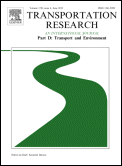
TRANSPORTATION RESEARCH PART D-TRANSPORT AND ENVIRONMENT
Scope & Guideline
Advancing sustainable solutions for transport and environment.
Introduction
Aims and Scopes
- Sustainable Transportation Solutions:
The journal emphasizes research aimed at developing sustainable transportation solutions, including electric vehicles, public transit systems, and active transportation modes like biking and walking. - Environmental Impact Assessment:
A core area of focus involves assessing the environmental impacts of various transportation modes and policies, including emissions modeling, noise pollution, and land use changes. - Technological Innovations in Transport:
The journal showcases studies that integrate new technologies, such as machine learning and smart infrastructure, to enhance transportation efficiency and reduce environmental footprints. - Policy Analysis and Evaluation:
Research on transportation policies, their effectiveness, and implications for sustainability is a significant theme, addressing global, national, and local initiatives. - Resilience and Adaptation to Climate Change:
There is a consistent emphasis on analyzing the resilience of transportation systems to climate-related disruptions and developing adaptation strategies. - Equity and Accessibility:
The journal explores issues related to equity in transportation access, focusing on marginalized communities and the social implications of transportation policies.
Trending and Emerging
- Electrification and Alternative Fuels:
Research on electric vehicles (EVs) and alternative fuel technologies has surged, focusing on adoption rates, infrastructure needs, and policy implications. - Machine Learning and Data Analytics:
There is a growing trend in utilizing machine learning and data analytics for transportation modeling, emissions prediction, and user behavior analysis. - Climate Resilience and Adaptation Strategies:
Increasing attention is being paid to the resilience of transportation systems in the face of climate change, with studies focusing on adaptation strategies. - Active Transportation and Micromobility:
Emerging themes include the promotion of active transportation modes (walking, cycling) and micromobility solutions like e-scooters, reflecting a shift towards more sustainable urban mobility. - Intermodal Transportation Solutions:
Research is increasingly examining the benefits of intermodal transportation systems that integrate various modes of transport to enhance sustainability and efficiency. - Social Equity in Transportation Access:
There is a notable increase in studies addressing social equity issues in transportation, focusing on access for disadvantaged populations and the implications of transport policies.
Declining or Waning
- Traditional Motor Vehicle Studies:
Research centered solely on conventional gasoline and diesel vehicles has diminished as the focus shifts towards electrification and alternative fuel sources. - Urban Sprawl and Car Dependency:
Studies exploring urban sprawl and its correlation with increased car dependency are becoming less frequent, as urban planning increasingly emphasizes sustainability and multimodal transport. - General Transportation Infrastructure:
Research that does not specifically address environmental impacts or sustainability considerations in transportation infrastructure development has seen a decline. - Single-Mode Transportation Analysis:
There is a noticeable reduction in studies focusing exclusively on single modes of transport (e.g., private cars or buses) without considering multimodal approaches. - Historical Transportation Studies:
Research focusing heavily on historical transportation patterns without integrating current sustainability challenges and technological advancements is becoming less common.
Similar Journals
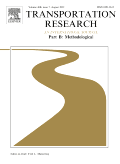
TRANSPORTATION RESEARCH PART B-METHODOLOGICAL
Enhancing transport systems with innovative academic discourse.TRANSPORTATION RESEARCH PART B - METHODOLOGICAL is a premier academic journal published by Pergamon-Elsevier Science Ltd, focusing on innovative methodologies and solutions in the field of transportation research. With a prestigious Q1 ranking in key categories, including Civil and Structural Engineering, Management Science and Operations Research, and Transportation, the journal demonstrates its vital role in advancing the academic discourse and practical applications within these domains. Boasting an impressive Scopus ranking of #20 in Civil and Structural Engineering and #15 in Transportation, it attracts high-quality research that informs policy, enhances transport systems, and contributes to sustainable development. The journal serves as a critical platform for researchers, practitioners, and students alike to disseminate findings that push the boundaries of transportation science. With a publication history dating from 1979 to 2024, TRANSPORTATION RESEARCH PART B is dedicated to fostering interdisciplinary collaborations and inspiring new methodologies to tackle complex transportation challenges. As a vital resource for the academic community, it leverages a broad international perspective to enrich the field and facilitate cutting-edge research.
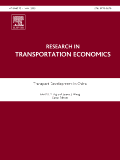
Research in Transportation Economics
Exploring the Economics of MobilityResearch in Transportation Economics, published by Elsevier Science Ltd, is a leading academic journal dedicated to the advancement of knowledge in the fields of transportation economics and policy. With an ISSN of 0739-8859 and an E-ISSN of 1875-7979, this journal serves as a critical platform for researchers, scholars, and practitioners to contribute groundbreaking studies and analyses that influence both theoretical frameworks and practical applications. Recognized with a Q1 rank in the category of Economics, Econometrics, and Finance (miscellaneous) and a Q2 rank in Transportation for 2023, the journal stands out in its commitment to rigorous research, presenting insights that enhance our understanding of economic dynamics within the transportation sector. With a robust Scopus ranking positioned at #9 out of 242 in its primary category, achieving a remarkable 96th percentile rating, Research in Transportation Economics is integral for those looking to explore the intersection of economics and transport systems. The journal welcomes contributions on various themes ranging from transport policy analyses to the evaluation of economic impacts on transportation systems, thus playing a vital role in shaping future policies and practices in the industry. As the field continues to evolve, the journal's annual publications from 2004 to 2024 will provide ongoing opportunities for scholarly exchanges and innovations.
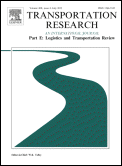
TRANSPORTATION RESEARCH PART E-LOGISTICS AND TRANSPORTATION REVIEW
Advancing Logistics Innovation and Transportation InsightsTRANSPORTATION RESEARCH PART E-LOGISTICS AND TRANSPORTATION REVIEW, published by PERGAMON-ELSEVIER SCIENCE LTD in the United Kingdom, is a leading academic journal that focuses on the complementary fields of logistics and transportation. Since its inception in 1997, this journal has been instrumental in shaping the discourse around various facets of transportation systems, supply chain optimization, and logistical efficiency. With an impressive 2023 impact factor and a prestigious ranking, classified as Q1 in key categories such as Business and International Management, Civil and Structural Engineering, and Management Science and Operations Research, it stands at the forefront of research in its domain. The journal is committed to disseminating high-quality research and offers open access options to enhance the visibility and impact of its articles. As it converges its content through 2024, it continues to provide invaluable insights to a diverse audience of researchers, practitioners, and students who are keen on advancing knowledge and practices in transportation and logistics.

Case Studies on Transport Policy
Transforming urban landscapes with impactful transport policies.Case Studies on Transport Policy, published by Elsevier, is an influential journal in the fields of transport policy, urban studies, and geographic planning. With its ISSN 2213-624X and E-ISSN 2213-6258, this quarterly journal has consistently maintained a strong impact within its scope, attaining Q1 rankings in Geography, Planning and Development and Urban Studies, as well as a Q2 ranking in Transportation for 2023. The journal provides a platform for high-quality research and practical case studies that contribute significantly to the understanding and improvement of transport systems and policies worldwide. Its rigorous peer-review process ensures that published articles are of the highest academic standard, appealing to researchers, policy-makers, and professionals alike. With a strong presence in several social sciences categories, the journal ranks highly in Scopus, positioning itself as a critical resource for those engaged in the strategic development and analysis of transport solutions. Located in Amsterdam, Netherlands, it aims to bridge the gap between research and real-world applications, facilitating knowledge exchange and innovative strategies in transport policy.

Transportation Safety and Environment
Innovating solutions for sustainable transportation practices.Transportation Safety and Environment is an esteemed open-access journal published by Oxford University Press, dedicated to advancing the field of transportation safety and environmental sustainability. Since its inception in 2019, the journal has rapidly gained recognition with an impressive Q2 category ranking in Control and Systems Engineering, Engineering (miscellaneous), and Safety, Risk, Reliability and Quality as of 2023. With an E-ISSN of 2631-4428, it provides a platform for high-quality research that addresses critical safety challenges and environmental impact within the transportation sector, covering a wide array of topics from vehicle safety measures to ecological considerations in transportation infrastructure. The journal’s open-access model promotes widespread distribution and accessibility of research findings, enabling researchers, professionals, and students to engage with the latest advancements and contribute to future developments in the field. Located in the heart of the United Kingdom at Great Clarendon St, Oxford OX2 6DP, England, Transportation Safety and Environment stands at the forefront of fostering innovative solutions for safer and more sustainable transportation practices worldwide.

Transport Policy
Navigating the complexities of transport systems with clarity.Transport Policy, published by Elsevier Science Ltd, is a leading international journal dedicated to advancing the understanding of transport systems and their policies. With an esteemed Q1 ranking in the fields of Geography, Planning and Development, Law, and Transportation, this journal stands out as a pivotal resource for researchers, professionals, and students alike. Recognized for its rigorous peer-reviewed articles, Transport Policy amalgamates interdisciplinary approaches to address critical issues in transportation governance, sustainability, and regulatory frameworks. As part of its mission to disseminate high-quality research, the journal supports significant findings that enhance policy-making and transport strategies globally. With a firm commitment to advancing scholarly discourse, Transport Policy continues to shape the landscape of transportation research through comprehensive studies that reflect contemporary challenges and innovative solutions. For those invested in the future of transport and policy, this journal is an essential cornerstone of knowledge and insight.

Revista de Transporte y Territorio
Exploring the Nexus of Mobility and GeographyRevista de Transporte y Territorio is a prominent academic journal published by the University of Buenos Aires, Institute of Geography, dedicated to the study of transportation systems and territorial dynamics. With its ISSN 1852-7175, this journal serves as a crucial platform for disseminating cutting-edge research and innovative practices in the fields of geography, urban planning, and transportation studies. Aimed at researchers, professionals, and students alike, the journal seeks to foster dialogue and understanding of the interrelationships between transportation and territorial development, providing insights into sustainable solutions for contemporary mobility challenges. Although currently not designated as Open Access, the journal is committed to high academic standards, ensuring that all published works undergo rigorous peer review. Situated in Buenos Aires, Argentina, the Revista de Transporte y Territorio not only highlights regional issues but also contributes to the global discourse on transportation and territory.
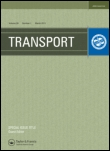
Transport
Fostering collaborations for a sustainable transport future.Transport is a leading open-access journal published by VILNIUS GEDIMINAS TECH UNIVERSITY, specializing in the fields of automotive and mechanical engineering. Since its transition to open access in 2018, the journal has become a vital platform for disseminating high-quality research and innovative practices in transport systems, engineering technologies, and sustainable mobility solutions. With an ISSN of 1648-4142 and an E-ISSN of 1648-3480, Transport is indexed in Scopus with notable rankings, including Q2 in Automotive Engineering and Q3 in Mechanical Engineering for 2023, reflecting its influential presence within these disciplines. Researchers and practitioners are encouraged to contribute to this scholarly community, where their work will reach a robust international audience, thereby advancing knowledge and fostering collaborations in the ever-evolving transport sector. Based in Lithuania, the journal is committed to maintaining rigorous peer-review standards and promoting interdisciplinary studies to address the complex challenges in transportation engineering.
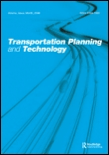
TRANSPORTATION PLANNING AND TECHNOLOGY
Exploring Innovations in Transportation SystemsTransportation Planning and Technology is a prestigious academic journal dedicated to advancing the fields of transportation planning and technology. Published by Taylor & Francis Ltd, this journal serves as a critical platform for disseminating high-quality research and innovative practices in the context of urban and regional transportation systems. With an ISSN of 0308-1060 and an E-ISSN of 1029-0354, the journal has established a significant foothold since its inception in 1972, spanning through to 2024. Recognized in the Q2 category of Geography, Planning and Development and the Q3 category of Transportation in the 2023 rankings, it reflects a solid impact factor supported by its Scopus classifications, holding a rank of #270/821 in Geography, Planning and Development and #72/141 in Transportation. Researchers, professionals, and students alike benefit from the journal's comprehensive scope, which encompasses theoretical aspects, practical applications, and policy implications related to transportation systems. As an essential resource in the field, it invites contributions that enhance our understanding of the complexities in transportation planning, making it a must-read for those engaged in related studies.
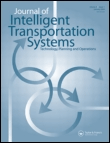
Journal of Intelligent Transportation Systems
Pioneering Research for Smart Mobility SolutionsThe Journal of Intelligent Transportation Systems is a premier peer-reviewed journal published by Taylor & Francis Inc, focusing on cutting-edge research in the fields of transportation systems and intelligent technologies. With an ISSN of 1547-2450 and an E-ISSN of 1547-2442, this journal stands out with its impressive impact, consistently ranking in the Q1 Quartile across multiple categories such as Aerospace Engineering, Applied Mathematics, and Automotive Engineering, among others. As of 2023, it holds distinguished Scopus rankings, including a remarkable #11 position in Aerospace Engineering, showcasing its significance in shaping contemporary research in intelligent transportation. Targeted at researchers, professionals, and students alike, the journal provides a forum for the dissemination of innovative ideas and technologies that enhance transportation systems’ efficiency, safety, and sustainability. The Journal of Intelligent Transportation Systems has been operating since 2004 and continues to play a vital role in advancing knowledge within its respective areas of study within the United Kingdom and globally.